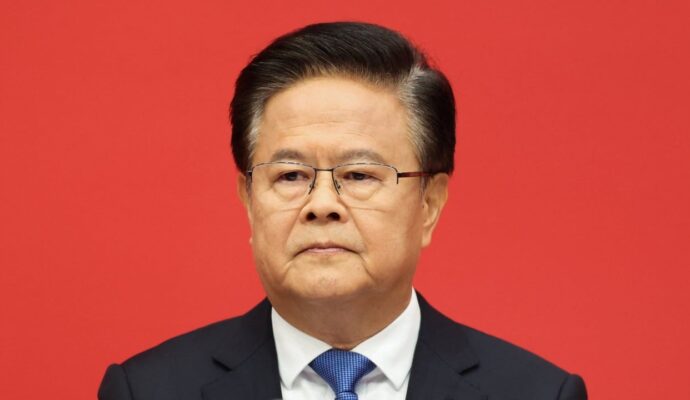While the ban has never been officially recognised by Beijing, South Korean artists and dramas have been off air for years. An agreement in 2021 between China Media Group and Korean Broadcasting System signalled a relaxation of the unstated restrictions, and since then, despite the shows still being unavailable on television, K-pop idols such as Jessica Jung from Girls’ Generation and Amber Liu from f (x) – who both hold US citizenship – have enjoyed mainstream success in China.
Even when bilateral relations hit a low point in August last year after an expansion of THAAD was announced, Chinese fans said they had not faced much hardship in continuing their activities.
Singer Amber Liu has enjoyed mainstream success in China despite the restrictions. Photo: Weibo
For Cao and her friends, what does affect their support are anti-Chinese sentiments or culturally insensitive materials from South Korean artists or productions.
“Generally if [a controversy] involves insulting remarks about China, and once an artist that they are following has an incident where they have insulted China, they will stop spending money on them,” Cao said, adding that she and her friends would then sell the merchandise they had and follow other artists instead.
One such controversy came recently from trending K-drama Welcome to Waikiki 2. It was criticised by Chinese internet users for dressing a homeless character in a filthy and battered Beijing Olympics jacket. Many saw the move as a deliberate jab at China, given the cultural and political significance of the country hosting the global sports event.
However, while disrespectful comments have been condemned, positive remarks by stars have been lauded by K-pop fans, in a strategy to help endorse their idols amid deteriorating bilateral relations, according to Egret Lulu Zhou, assistant professor of literature and cultural studies at the Education University of Hong Kong.
“The obvious trend following the restrictions is that mainland Chinese fans become relatively low-key in showing support to their idols, especially when compared to fans of Chinese stars,” she said.
But Zhou also said some fans would deliberately highlight instances when an artist had shown respect for Chinese culture, so as to help protect them from accusations of being anti-China.
She pointed to fans of Jung playing up her use of the term “Chinese New Year”, as opposed to “Lunar New Year”, on social media, in the hopes of the public seeing her as an ally of Chinese culture.
“Her fans would also encourage each other to avoid mentioning her too much on some public platforms, thinking that if she had too much of a presence on Chinese social media, fans of domestic artists would feel agitated,” Zhou said, adding that K-pop fans had made some of their activities more subtle after the ban.
Shenzhen resident Grace Wang, a fan of nine-member girl group Twice, said merchandise was actually more accessible in China compared with the United States, where she studies, due to her hometown’s geographical proximity to South Korea.
“Albums and photocards are much cheaper in China, and it is easier to purchase merchandise here since shipping from South Korea and Japan is pretty convenient,” Wang said. She collects Twice’s photos and albums, and pays for a subscription on Bubble, a platform for artist-to-fan communications.
Changes in the relationship between Seoul and Beijing have not impeded the 18-year-old, with her sense of national identity not affecting the entertainment she consumes.
“I don’t think we have a moral obligation to feel collective national pride – I personally don’t feel it strongly – but those who do feel that should be respected and have the right to express that, and other people should understand,” Wang said.
She added that an idol’s political views did not affect her own feelings towards them.
When a performer at the opening ceremony of the Beijing Winter Olympics wore the hanbok, a traditional Korean dress, K-pop singer Chungha was accused of taking a jab at the fashion choice, saying on a live broadcast: “Please keep that in mind. It is our traditional clothing, hanbok.”

